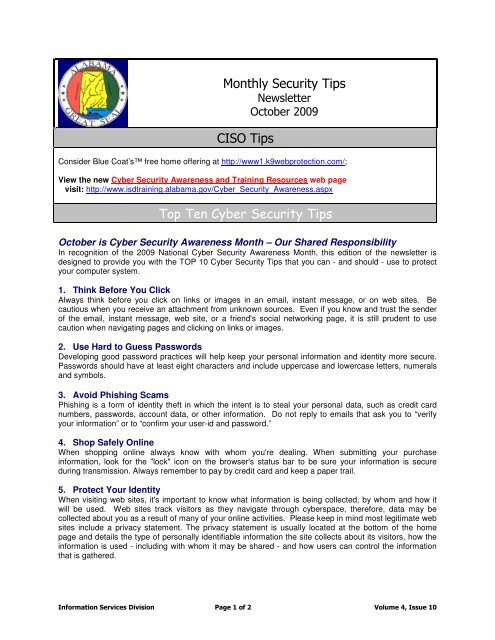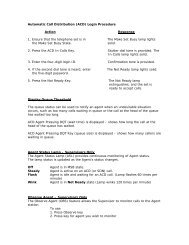Monthly Security Tips CISO Tips Top Ten Cyber ... - Alabama.gov
Monthly Security Tips CISO Tips Top Ten Cyber ... - Alabama.gov
Monthly Security Tips CISO Tips Top Ten Cyber ... - Alabama.gov
You also want an ePaper? Increase the reach of your titles
YUMPU automatically turns print PDFs into web optimized ePapers that Google loves.
<strong>Monthly</strong> <strong>Security</strong> <strong>Tips</strong><br />
Newsletter<br />
October 2009<br />
<strong>CISO</strong> <strong>Tips</strong><br />
Consider Blue Coat’s free home offering at http://www1.k9webprotection.com/;<br />
View the new <strong>Cyber</strong> <strong>Security</strong> Awareness and Training Resources web page<br />
visit: http://www.isdtraining.alabama.<strong>gov</strong>/<strong>Cyber</strong>_<strong>Security</strong>_Awareness.aspx<br />
<strong>Top</strong> <strong>Ten</strong> <strong>Cyber</strong> <strong>Security</strong> <strong>Tips</strong><br />
October is <strong>Cyber</strong> <strong>Security</strong> Awareness Month – Our Shared Responsibility<br />
In recognition of the 2009 National <strong>Cyber</strong> <strong>Security</strong> Awareness Month, this edition of the newsletter is<br />
designed to provide you with the TOP 10 <strong>Cyber</strong> <strong>Security</strong> <strong>Tips</strong> that you can - and should - use to protect<br />
your computer system.<br />
1. Think Before You Click<br />
Always think before you click on links or images in an email, instant message, or on web sites. Be<br />
cautious when you receive an attachment from unknown sources. Even if you know and trust the sender<br />
of the email, instant message, web site, or a friend's social networking page, it is still prudent to use<br />
caution when navigating pages and clicking on links or images.<br />
2. Use Hard to Guess Passwords<br />
Developing good password practices will help keep your personal information and identity more secure.<br />
Passwords should have at least eight characters and include uppercase and lowercase letters, numerals<br />
and symbols.<br />
3. Avoid Phishing Scams<br />
Phishing is a form of identity theft in which the intent is to steal your personal data, such as credit card<br />
numbers, passwords, account data, or other information. Do not reply to emails that ask you to “verify<br />
your information” or to “confirm your user-id and password.”<br />
4. Shop Safely Online<br />
When shopping online always know with whom you're dealing. When submitting your purchase<br />
information, look for the "lock" icon on the browser's status bar to be sure your information is secure<br />
during transmission. Always remember to pay by credit card and keep a paper trail.<br />
5. Protect Your Identity<br />
When visiting web sites, it's important to know what information is being collected, by whom and how it<br />
will be used. Web sites track visitors as they navigate through cyberspace, therefore, data may be<br />
collected about you as a result of many of your online activities. Please keep in mind most legitimate web<br />
sites include a privacy statement. The privacy statement is usually located at the bottom of the home<br />
page and details the type of personally identifiable information the site collects about its visitors, how the<br />
information is used - including with whom it may be shared - and how users can control the information<br />
that is gathered.<br />
Information Services Division Page 1 of 2 Volume 4, Issue 10
6. Dispose of Information Properly<br />
Before discarding your computer or portable storage devices, you need to be sure that the data contained<br />
on the device has been erased or "wiped." Read/writable media (including your hard drive) should be<br />
"wiped" using Department of Defense (DOD) compliant software.<br />
7. Protect Your Children Online<br />
Discuss and set guidelines and rules for computer use with your child. Post these rules by the computer<br />
as a reminder. Familiarize yourself with your child's online activities and maintain a dialogue with your<br />
child about what applications they are using. Consider using parental control tools that are provided by<br />
some Internet Service Providers and available for purchase as separate software packages.<br />
8. Protect Your Portable Devices<br />
It is important to make sure you secure your portable devices to protect both the device and the<br />
information contained on the device. Always establish a password on all devices. If your device has<br />
Bluetooth functionality and it’s not used, check to be sure this setting is disabled. Some devices have<br />
Bluetooth-enabled by default. If the Bluetooth functionality is used, be sure to change the default<br />
password for connecting to a Bluetooth enabled device. Encrypt data and data transmissions whenever<br />
possible.<br />
9. Secure Your Wireless Network<br />
Wireless networks are not as secure as the traditional "wired" networks, but you can minimize the risk on<br />
your wireless network by enabling encryption, changing the default password, changing the Service Set<br />
Identifier (SSID) name (which is the name of your network) as well as turning off SSID broadcasting and<br />
using the MAC filtering feature, which allows you to designate and restrict which computers can connect<br />
to your wireless network.<br />
10. Back-Up Important Files<br />
Back-up your important files minimally on a weekly basis. Don’t risk losing your important documents,<br />
images or files!<br />
For more information on the <strong>Top</strong> 10 <strong>Cyber</strong> <strong>Security</strong> <strong>Tips</strong>,<br />
please visit the MS-ISAC <strong>Monthly</strong> <strong>Cyber</strong> <strong>Security</strong> Newsletter <strong>Tips</strong>:<br />
www.msisac.org/awareness/news/<br />
************************************************************************<br />
OCTOBER IS NATIONAL CYBER SECURITY AWARENESS MONTH<br />
“OUR SHARED RESPONSIBILITY”<br />
www.msisac.org | www.staysafeonline.org | www.nascio.org | www.dhs.<strong>gov</strong><br />
Brought to you by:<br />
www.msisac.org<br />
The information provided in the <strong>Monthly</strong> <strong>Security</strong> <strong>Tips</strong> Newsletters is intended to increase the security awareness of an organization’s end<br />
users and to help them behave in a more secure manner within their work environment. While some of the tips may relate to maintaining a<br />
home computer, the increased awareness is intended to help improve the organization’s overall cyber security posture.<br />
Information Services Division Page 2 of 2 Volume 4, Issue 10



